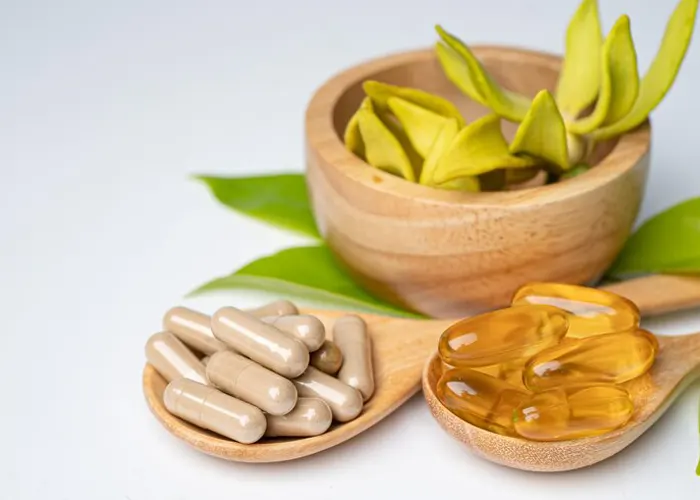Supplements for Menopause: What You Should Know
Navigating the challenges of perimenopause and menopause can be daunting, but the right supplements can make a significant difference in managing symptoms like hot flashes, mood swings, and sleep disturbances.

Key Supplements for Menopause Relief
Here’s a brief overview of some of the most beneficial supplements for perimenopausal women:
1. Calcium
- Purpose: Supports bone health and helps prevent osteoporosis.
- Recommended Dose: 1,200 mg per day (including dietary sources).
- Top Food Sources: Dairy products (milk, yogurt, cheese), leafy greens (kale, collard greens), fortified plant milks, fish (sardines, salmon), almonds, tofu, and fortified cereals.
2. Vitamin D
- Purpose: Enhances calcium absorption, supports immune function, and helps regulate mood.
- Recommended Dose: 600-800 IU per day, depending on individual needs and sun exposure.
3. Omega-3 Fatty Acids
- Purpose: Reduces inflammation, alleviates mood swings and anxiety, and supports heart health.
- Recommended Dose: 1,000-2,000 mg of EPA and DHA combined per day.
4. Vitamin B Complex
- Purpose: Supports energy levels, mood regulation, and hormonal balance.
- Recommended Dose: Varies by specific vitamin (e.g., B6, B12, and folate).
5. Magnesium (Glycinate)
- Purpose: Promotes better sleep, mood regulation, and muscle function, and may help reduce anxiety and irritability.
- Recommended Dose: 310-320 mg per day.
6. Vitamin K2
- Purpose: Vitamin K2 is taken to support bone strength, cardiovascular health, and proper calcium utilization in the body.
- Recommended Dose: 45 to 180 mcg per day, with higher doses sometimes used for specific health benefits. It is found in fermented foods like natto, dairy products such as cheese, and animal products like egg yolks and liver.
- Natural Source: Fermented foods like natto, dairy products such as cheese, and animal products like egg yolks and liver.
7. Probiotics
- Purpose: Supports gut health, digestion, and mood regulation.
- Recommended Dose: Varies; look for a product with multiple strains and at least 1 billion CFUs. Choose enteric-coated probiotics to ensure they survive stomach acid and reach your intestines.
- Natural Sources: Fermented foods like tempeh, sauerkraut, and kombucha.
8. Creatine
- Purpose: Beneficial for muscle and bone health, cognitive function, and energy. Creatine may also help improve mood and reduce fatigue.
- Recommended Dose: 3-5 grams per day.
9. L-Theanine
- Purpose: L-Theanine helps reduce stress and anxiety, promote relaxation without sedation, and improve sleep quality.
- Recommended Dose: 100–200 mg per day.
- Natural Sources: L-Theanine is naturally found in tea leaves, particularly in green tea.
10. Ashwagandha
- Purpose: Ashwagandha is an adaptogen that helps reduce stress, improve mood, support hormonal balance, and boost energy levels.
- Recommended Dose: 300–600 mg per day.
- Natural Sources: Ashwagandha is derived from the root of the Withania somnifera plant, typically available as a powder or extract.
11. Berberine
- Purpose: Berberine supports metabolic health, improves blood sugar regulation, and has anti-inflammatory properties.
- Recommended Dose: 500–1,000 mg per day, often divided into two or three doses.
- Natural Sources: Berberine is found in several plants, including goldenseal, barberry, and Oregon grape.
12. Inositol
- Purpose: Inositol helps support healthy mood, reduce anxiety, improve insulin sensitivity, and aid in hormonal balance, especially for women with PCOS.
- Recommended Dose: 1–4 grams per day.
- Natural Sources: Inositol is found in foods such as fruits (especially citrus), beans, grains, and nuts.
Tips when buying supplements: Supplements are not regulated by the FDA, meaning they do not have to undergo the same rigorous testing as prescription medications. This lack of regulation means that not all supplements are created equal.
Before considering any supplement, it’s crucial to understand a few key points to ensure you’re making the best choices for your body and budget.
- Third-party testing is essential
Since supplements are not FDA-regulated, it’s wise to look for products that are third-party tested by independent organizations. Reputable third-party testers like NSF International, USP (United States Pharmacopeia), and Informed-Sport ensure that the supplement contains what the label claims and is free from contaminants. This extra layer of quality control can help you avoid ineffective or potentially harmful products.
- Avoid unnecessary additives
Many supplements contain fillers, artificial flavors, or preservatives that are unnecessary and could potentially interfere with the effectiveness of the product. When choosing a supplement, look for ones that are free from these additives and focus on the ingredients that will provide the benefits you’re seeking.
- Don’t waste your money
Before adding any new supplement to your routine, consult with your physician. They can help you determine whether you actually need a particular supplement based on your current diet, health conditions, and any medications you may be taking. For instance, if you’re already getting enough Vitamin B12 from your diet, you may not need to supplement with additional B12. Let us guide you through your decision on supplementation so that you don’t buy or take things you don’t need.
Additional tips for menopause supplementation:
- Be Informed: Research the specific supplements that will support your unique symptoms and health needs. Consider your current diet, lifestyle, and any pre-existing health conditions.
- Monitor Your Progress: Keep track of how you feel after starting any supplement regimen. It may take time to see results, but you should notice improvements in energy, mood, or symptom relief after a few weeks.
- Maintain a Balanced Diet: Supplements are most effective when combined with a healthy, nutrient-rich diet. Focus on eating a variety of whole foods that provide essential vitamins and minerals, while using supplements to fill in any gaps.
Dr. Malia Swanson
Boulder Menopause


